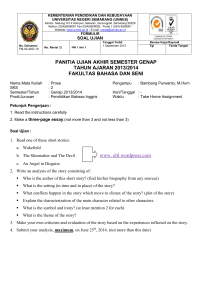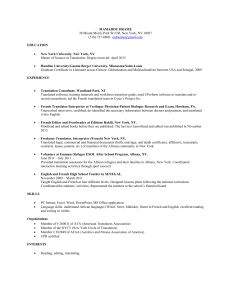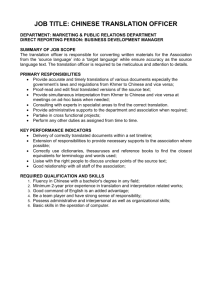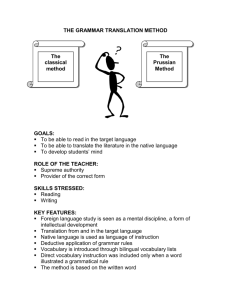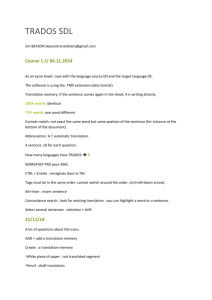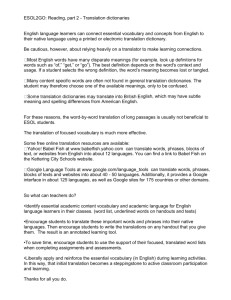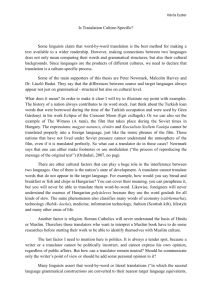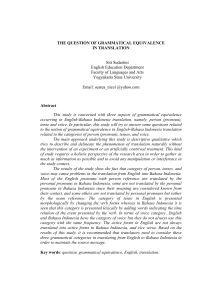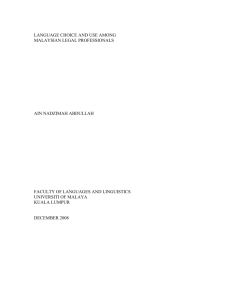grammatical equivalence in the indonesian translation of jk rowlings
advertisement
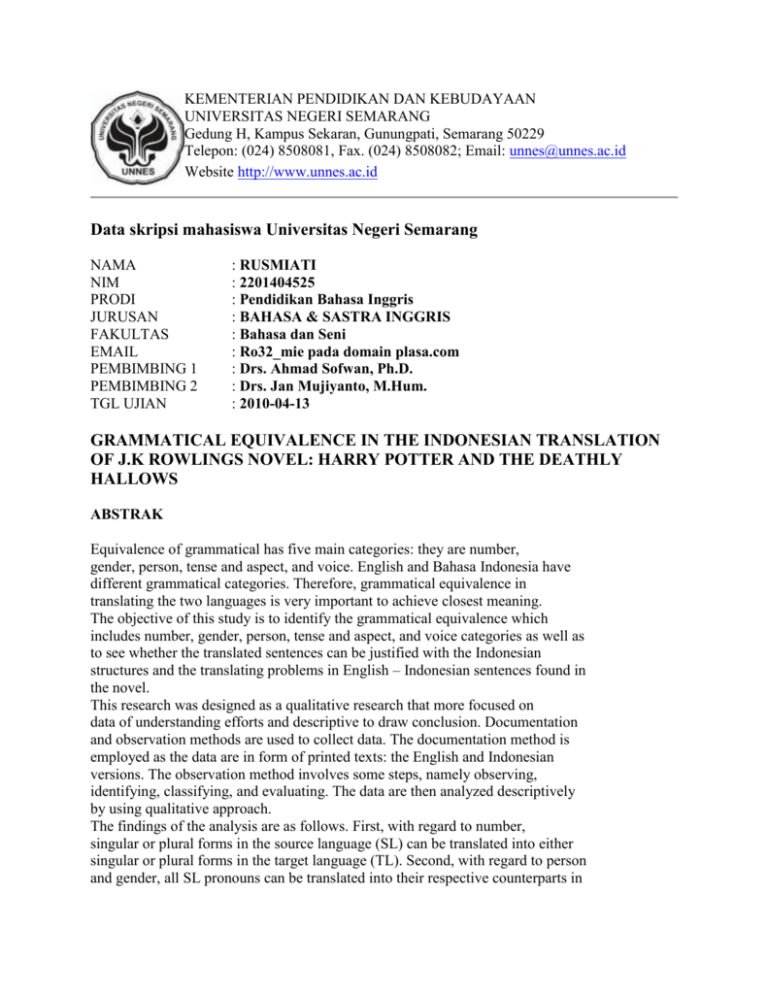
KEMENTERIAN PENDIDIKAN DAN KEBUDAYAAN UNIVERSITAS NEGERI SEMARANG Gedung H, Kampus Sekaran, Gunungpati, Semarang 50229 Telepon: (024) 8508081, Fax. (024) 8508082; Email: unnes@unnes.ac.id Website http://www.unnes.ac.id Data skripsi mahasiswa Universitas Negeri Semarang NAMA NIM PRODI JURUSAN FAKULTAS EMAIL PEMBIMBING 1 PEMBIMBING 2 TGL UJIAN : RUSMIATI : 2201404525 : Pendidikan Bahasa Inggris : BAHASA & SASTRA INGGRIS : Bahasa dan Seni : Ro32_mie pada domain plasa.com : Drs. Ahmad Sofwan, Ph.D. : Drs. Jan Mujiyanto, M.Hum. : 2010-04-13 GRAMMATICAL EQUIVALENCE IN THE INDONESIAN TRANSLATION OF J.K ROWLINGS NOVEL: HARRY POTTER AND THE DEATHLY HALLOWS ABSTRAK Equivalence of grammatical has five main categories: they are number, gender, person, tense and aspect, and voice. English and Bahasa Indonesia have different grammatical categories. Therefore, grammatical equivalence in translating the two languages is very important to achieve closest meaning. The objective of this study is to identify the grammatical equivalence which includes number, gender, person, tense and aspect, and voice categories as well as to see whether the translated sentences can be justified with the Indonesian structures and the translating problems in English – Indonesian sentences found in the novel. This research was designed as a qualitative research that more focused on data of understanding efforts and descriptive to draw conclusion. Documentation and observation methods are used to collect data. The documentation method is employed as the data are in form of printed texts: the English and Indonesian versions. The observation method involves some steps, namely observing, identifying, classifying, and evaluating. The data are then analyzed descriptively by using qualitative approach. The findings of the analysis are as follows. First, with regard to number, singular or plural forms in the source language (SL) can be translated into either singular or plural forms in the target language (TL). Second, with regard to person and gender, all SL pronouns can be translated into their respective counterparts in TL. Third, SL tenses and aspects can be translated lexically or understood from the context. Fourth, the active forms in SL can be translated into either TL active or passive forms, while the passive forms are translated into TL passive forms. In translating, when the message or information is eliminated by changing the form of sentence, it will create problems such as found in the novel. It is suggested that translators should have capability in grammatical categories in English and Bahasa Indonesia so that s/he can find the closest equivalence and the translation is natural and acceptable by the TL readers. KATA KUNCI equivalence, grammatical, translation REFERENSI Alwi, H. et al. 2003. Tata Bahasa Baku Bahasa Indonesia (3rd ed). Jakarta: Balai Pustaka. Azar, B.S. 1989. Understanding and Using English Grammar Second Edition. New Jersey: Prentice Hall. Baker, M. 1992. In Other Words; A Course Book of Translation. London and New York: Routledge. Chaer, A. 2000. Tata Bahasa Praktis Bahasa Indonesia Edisi Revisi. Jakarta: Rineka Cipta. Eppert, F. 1982. Transfer and Translation in Language Learning and Teaching. Singapore: Singapore University Press. ______(ed.). 2000. Transfer and Translation in Language Learning and Teaching; Anthology Series 12. Jakarta: Direktorat Jenderal Pendidikan Tinggi; Departemen Pendidikan Nasional Frank, M. 1972. Modern English; Exercises for Non-Native Speakers. New Jersey: Prentice Hall.Inc. Gile, D. 1984. Benjamins Translation Library; Basic Concepts and models fro Interpreter and Translator Training. Paris: INALCO and ISIT. Hartono. 2005. Belajar dan Menerjemahkan; Teori dan Praktek. Malang: UMM. Hewson, L and Jacky Martin. 1991. Redefining Translation; The Variational Approach. London: Routladge. Johnson, K and Helen J. 1998. Encyclopedic Dictionary of Applied Linguistics: A Handbook for Language Teaching. Blackwell. Machali, R. 2000. Pedoman Bagi Penerjemah. Jakarta: PT. Grasindo. Pawito, Ph.D. 2007. Penelitian Komunikasi Kualitatif. Yogyakarta: LKiS. Robinson, D. 2005. Menjadi Penerjemah Profesional; Becoming a Translator. Yogyakarta: Pustaka Pelajar. Sakri, A. 1984. Ihwal Menerjemahkan. Bandung: ITB Bandung Simatupang, M.D.S. 2000. Pengantar Teori Terjemahan. Jakarta: Direktorat Jenderal Pendidikan Tinggi; Departemen Pendidikan Nasional. Venuti, L. 1998. The Scandals of Translation; Towards An Ethics of Difference. London and New York: Routledge; Taylor & Fransic Group. http://www.who.int/substance_abuse/research_tools/translation/en/.(accessed14/0 5/09) http://www.translationschools.org/translation/process/problems.asp.(accessed14/0 5/09) http://archial.blogspot.com/.(accessed14/05/09) http://www.proz.com/translation-articles/articles/2017/1/Equivalence-inTranslation. (accessed14/05/09) http://majalah.tempointeraktif.com/id/arsip/2009/05/11/BHS/mbm.20090511.BHS 130524.id.html. (accessed14/05/09) http://kresna-agung.blogspot.com/2009/02/kerancuan-memahami-tensesbahasa. html. (accessed14/05/09) http://translationdirectory.com. (accessed14/05/09) http://www.sil.org./translation/theory.htm. (accessed14/05/09) http;//accurapid.com/journal/14equiv.htm. (accessed14/05/09) http://akasaka.cool.ne.jp/kakeru3/naganuma2.html. (accessed14/15/09)
